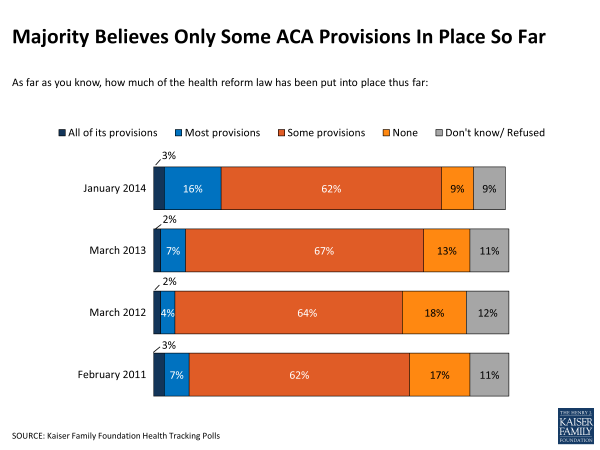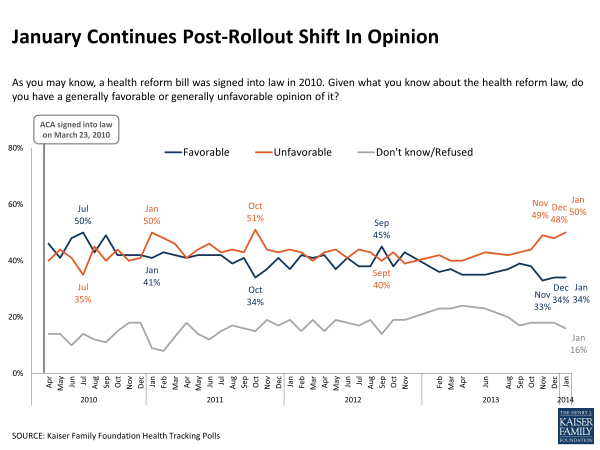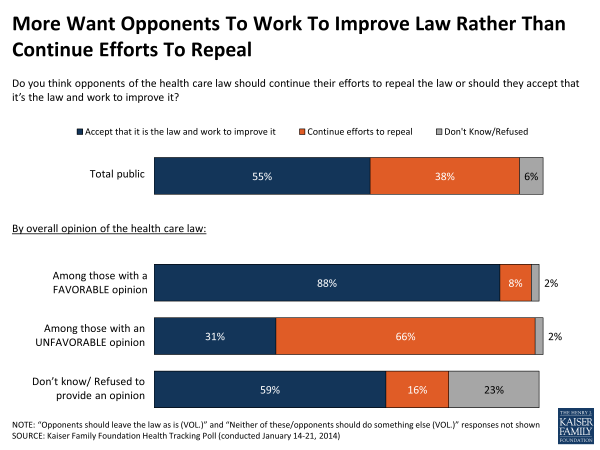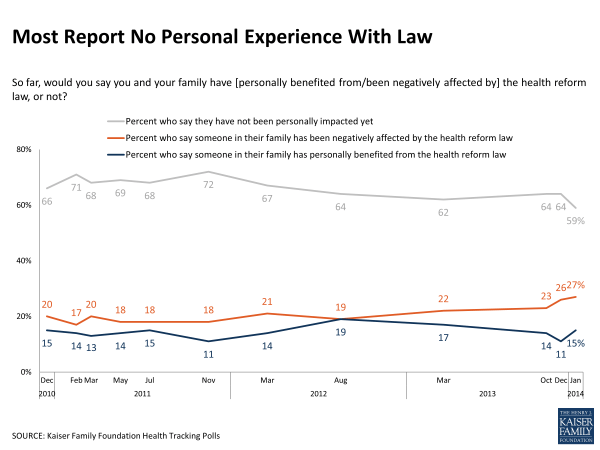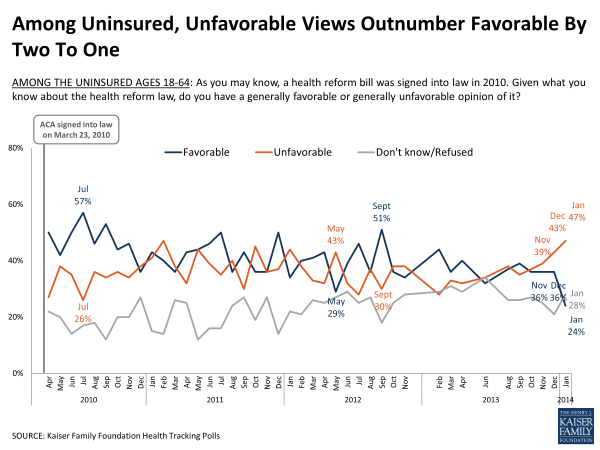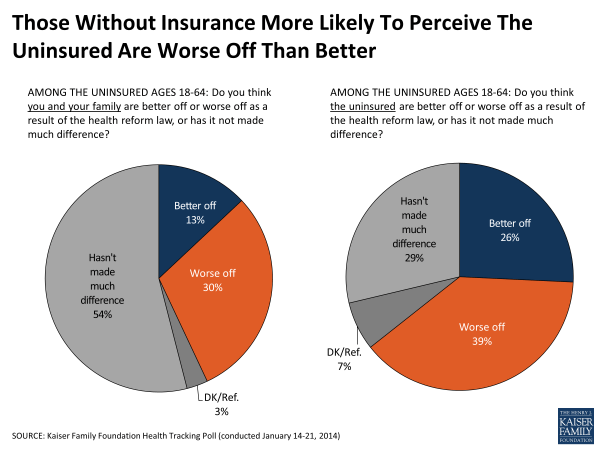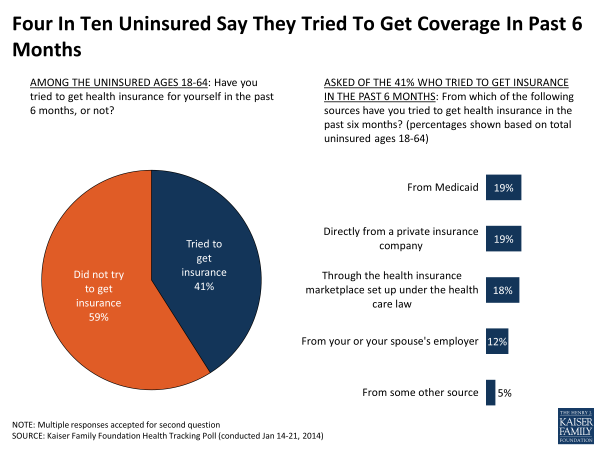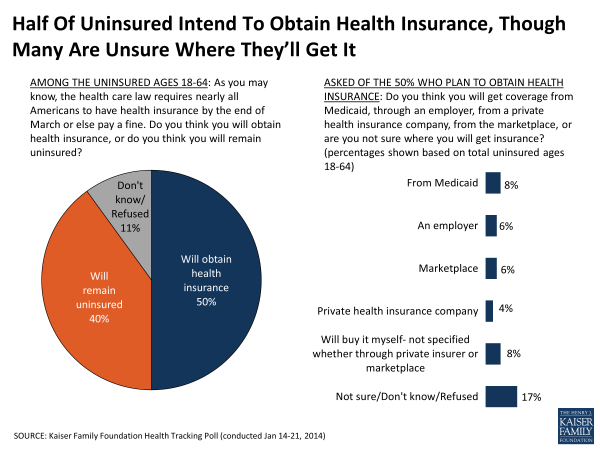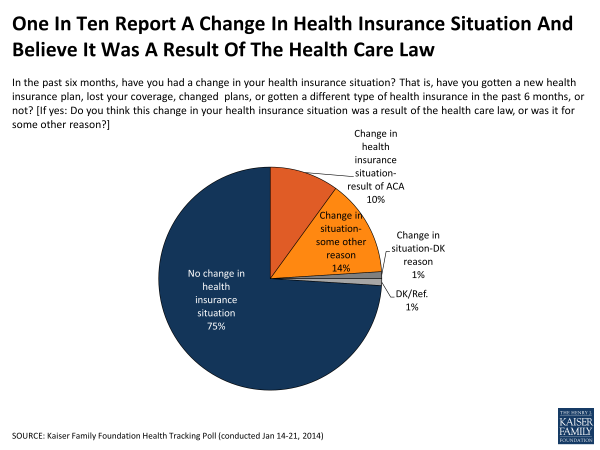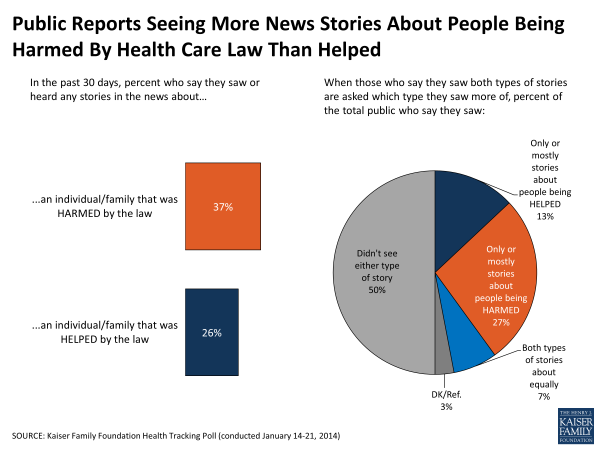Kaiser Health Tracking Poll: January 2014
January 1st may have been a monumental date for those working on and closely following the Affordable Care Act (ACA), but the latest Kaiser Health Tracking Poll finds little change in the public’s knowledge and views of the law. With enrollment in new coverage options underway, a majority of the public believes that only “some” of the ACA’s provisions have been put into place, while just about one in five think “most” or “all” of the law has been implemented. Awareness of the law’s individual mandate and health insurance exchanges has increased slightly since last year, but about four in ten of the public overall and half the uninsured remain unaware of other major provisions. For the third month in a row, overall views of the law remain at their post-rollout more negative levels (50 percent unfavorable, 34 percent favorable), though over half the public – including three in ten of those who view the law unfavorably – say opponents should work on improving the law rather than keeping up efforts to repeal it.
Among the uninsured – a key group for outreach under the law – unfavorable views now outnumber favorable views by roughly a 2-to-1 margin (47 percent versus 24 percent). This is a change from last month when 43 percent of the uninsured had an unfavorable view and 36 percent were favorable. More of those without coverage say the law has made the uninsured as a group worse off (39 percent) than better off (26 percent). Despite these views, large shares of the uninsured see health insurance as “very important” and say they need it, while four in ten say they’ve tried to get coverage in the past 6 months, and half expect to get it this year.
January 1st Didn’t Register With The Public
The latest Kaiser Health Tracking Poll finds that even after most of the ACA’s major provisions took effect on January 1, a large majority of the public (62 percent) continues to believe that only “some” provisions of the ACA have been put into place thus far. Only about one in five (19 percent) say “most” or “all” provisions have been implemented, up somewhat from 9 percent last March.
When it comes to the individual elements of the law, awareness has increased slightly for two of the big ones: the individual mandate (81 percent now say it is part of the law, up from 74 percent last March) and the health insurance exchanges (68 percent, up from 58 percent). Still, large shares of the public – and even higher shares of the uninsured – remain unaware of some other major provisions of the law. For example, roughly four in ten adults overall, and about half of the uninsured, are not aware that the law provides financial help to low- and moderate-income Americans to help them purchase coverage, gives states the options of expanding their Medicaid programs, and prohibits insurance companies from denying coverage based on pre-existing conditions.
| FIGURE 2: Many Uninsured Remain Unaware Of Some Major ACA Provisions | ||||
| Total public | Uninsured, age<65 | |||
| To the best of your knowledge, would you say the health reform law does or does not…? | Yes, law does this | No/Don’t know | Yes, law does this | No/Don’t know |
| Require nearly all Americans to have health insurance or else pay a fine | 81 | 19 | 79 | 22 |
| Create health insurance exchanges or marketplaces where people who don’t get coverage through their employers can shop for insurance and compare prices and benefits | 68 | 31 | 62 | 38 |
| Provide financial help to low and moderate income Americans who don’t get insurance through their jobs to help them purchase coverage | 63 | 38 | 54 | 46 |
| Give states the option of expanding their existing Medicaid program to cover more low-income, uninsured adults | 58 | 42 | 49 | 51 |
| Prohibit insurance companies from denying coverage because of a person’s medical history | 54 | 46 | 48 | 53 |
On a more personal level, 44 percent of the public overall – including 66 percent of the uninsured –continue to say they don’t have enough information to understand how the law will impact their families.
Overall Views Remain Negative, But Public Wants Opponents To Work On Fixes Rather Than Repeal
Views of the law overall remain more negative than positive this month, with 50 percent saying they have an unfavorable view and 34 percent favorable, almost identical to the split in opinion since November. Still, more than half the public overall, including three in ten of those who view the law unfavorably, say opponents should accept that it’s the law of the land and work to improve it, while fewer than four in ten want opponents to keep up the repeal fight.
Most Continue To Say They Haven’t Felt An Impact From The ACA, But More Feel They’ve Been Affected Negatively Than Positively
At the same time, most Americans continue to report no personal experience with the law to date. Roughly six in ten say they haven’t been directly impacted by the law in a positive or negative way, though the share who perceive that they’ve been negatively impacted continues to be larger than the share who feel they’ve benefited (27 percent versus 15 percent). Those who feel they’ve been negatively impacted by the law are most likely to point to high costs of health care and insurance as the reason. With official data showing that only a very small share of the public overall have enrolled in the ACA’s coverage arrangements so far, these shares likely reflect people’s perceptions of being helped or harmed by the law, rather than actual experiences with new insurance options under the ACA.
Among The Uninsured, Unfavorable Views Outnumber Favorable By 2-to-1, And More Believe They’re Worse Off Under The Law Than Better
Among the uninsured – a key group targeted by the ACA – views of the law shifted negative this month. A quarter (24 percent) of those who currently lack coverage now say they have a favorable view of the law, while nearly twice as many (47 percent) have an unfavorable view and about three in ten (28 percent) decline to offer an opinion. In December, views among the uninsured were more evenly split (36 percent favorable, 43 percent unfavorable).
More than half of the uninsured (54 percent) say the law hasn’t made much difference for their families, and the share who feel they’re worse off as a result of the law is more than twice the share who feel they’re better off (30 percent versus 13 percent). When asked about the uninsured as a group, those without coverage are more likely to say the law has left this group worse off than better (39 percent versus 26 percent). We will continue to track these perceptions as more of the uninsured gain coverage.
Most Uninsured Say They Need Coverage; Four In Ten Have Tried To Get It In The Last 6 Months; Half Expect To Get It This Year
The survey also finds that most of the uninsured see health insurance coverage as very important (70 percent) and something they need (73 percent). Among those who currently lack coverage, four in ten say they have tried to get it in the past 6 months, including about one in five each who tried to get coverage from Medicaid (19 percent), directly from a private insurance company (19 percent), and through a state or federal health insurance exchange (18 percent).1
When told or reminded of the law’s requirement that most Americans obtain insurance or pay a fine, half the uninsured say they expect to get coverage, including about one in five (18 percent) who expect to purchase it themselves (either from a private insurance company or through an exchange), 8 percent who expect to get it from Medicaid, and 6 percent who expect to get coverage from an employer. A sizable share (17 percent of the uninsured overall) say they expect to get coverage but are unsure where.
Four in ten of those without coverage say they expect to remain uninsured, with most of these saying they don’t think they’ll be able to find an affordable plan. As noted above, many of the uninsured remain unaware of the additional options available to them under the ACA, including the insurance exchanges, subsidies, and expanded Medicaid in some states.
A Quarter Of The Public Overall Report A Change In Their Insurance Situation In The Past 6 months, Including One In Ten Who Attribute It To The ACA
As we pointed out in this Data Note [hyperlink], national public opinion polls aren’t the best vehicle for measuring the experiences of the small group of people who’ve actually gained coverage through the ACA so far. One thing we can do on the Kaiser Health Tracking Poll is to measure people’s perceptions about changes in their insurance situation and what role they think the law has played in those changes. This month’s poll finds a quarter (24 percent) of the public reports that they’ve had a change in their health insurance situation in the past 6 months, and four in ten of these (10 percent of the public overall) believe this change was a result of the health care law.
Among the 10 percent who perceive that their insurance status has changed as a result of the ACA, twice as many believe it was a change for the worse rather than for the better. However, about half this group currently has coverage through an employer, and most report that the change in their coverage was a change from one plan to another, suggesting that many of them may be attributing regular changes in insurance coverage to the law.
| FIGURE 11: Perceptions And Demographics Of Those Who Believe They Had A Change In Insurance Status As A Result Of The ACA | |
| Among the 10% who had a change in insurance status and believe it was a result of the ACA | |
| Would you say the change in your health insurance situation was a change for the better or a change for the worse? | |
| Better | 29% |
| Worse | 61 |
| No difference/Don’t know/Refused | 10 |
| Which best describes the change in your health insurance situation? | |
| Changed plans | 45 |
| Lost or dropped coverage | 14 |
| Got health insurance after being uninsured | 15 |
| Costs went up (vol.) | 12 |
| Some other change | 10 |
| Current health insurance status/type | |
| Insured (NET) | 92 |
| Employer | 50 |
| Self-purchase | 19 |
| Medicare | 6 |
| Medicaid | 13 |
| Other coverage | 3 |
| Uninsured | 6 |
| Don’t know/Refused | 2 |
More Report Seeing News Stories About Negative Rather Than Positive Impacts On People
This month’s poll also examined views of the media environment surrounding the ACA, and finds the majority say coverage of the law is focused more on politics and controversies (56 percent) rather than on how the law might impact people (6 percent), shares that have held steady since last fall. When it comes to personal stories in the news, about half the public (47 percent) reports hearing at least one story in the last month about an individual or family who was impacted by the law, with about twice as many saying they saw more stories about people being harmed (27 percent) as saying they saw more stories about people being helped (13 percent).
1. Multiple responses were allowed, since people may have tried to get coverage from more than one source in the past 6 months.

